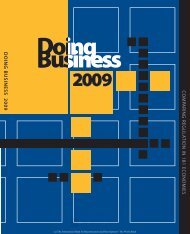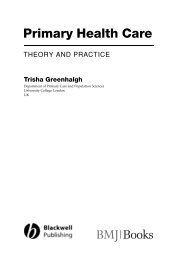- Page 1 and 2: Translational Medicine Series 6 Can
- Page 3 and 4: TRANSLATIONAL MEDICINE SERIES 1. Pr
- Page 5 and 6: Informa Healthcare USA, Inc. 52 Van
- Page 10 and 11: Preface vii Table 1 A Diverse Techn
- Page 12 and 13: Preface . . . . v Contributors . .
- Page 14 and 15: Contributors Pedro Alves Ludwig Ins
- Page 16 and 17: 1 Factoring in Antigen Processing i
- Page 18 and 19: Factoring in Antigen Processing in
- Page 20 and 21: Factoring in Antigen Processing in
- Page 22 and 23: Factoring in Antigen Processing in
- Page 24 and 25: Factoring in Antigen Processing in
- Page 26 and 27: Factoring in Antigen Processing in
- Page 28 and 29: Factoring in Antigen Processing in
- Page 30 and 31: Factoring in Antigen Processing in
- Page 32 and 33: Factoring in Antigen Processing in
- Page 34 and 35: Factoring in Antigen Processing in
- Page 36 and 37: Factoring in Antigen Processing in
- Page 38 and 39: Factoring in Antigen Processing in
- Page 40 and 41: Factoring in Antigen Processing in
- Page 42 and 43: Factoring in Antigen Processing in
- Page 44 and 45: Factoring in Antigen Processing in
- Page 46 and 47: 2 Outlining the Gap Between Preclin
- Page 48 and 49: Preclinical Models and Clinical Sit
- Page 50 and 51: Table 1 Examples of Preclinical Act
- Page 52 and 53: Preclinical Models and Clinical Sit
- Page 54 and 55: Preclinical Models and Clinical Sit
- Page 56 and 57: Preclinical Models and Clinical Sit
- Page 58 and 59:
Preclinical Models and Clinical Sit
- Page 60 and 61:
Preclinical Models and Clinical Sit
- Page 62 and 63:
Preclinical Models and Clinical Sit
- Page 64 and 65:
Preclinical Models and Clinical Sit
- Page 66 and 67:
Preclinical Models and Clinical Sit
- Page 68:
Preclinical Models and Clinical Sit
- Page 71 and 72:
56 Srinivasan disease agents. Garda
- Page 73 and 74:
58 Srinivasan expressing various kn
- Page 75 and 76:
60 Srinivasan The above-mentioned a
- Page 77 and 78:
62 Srinivasan (69). In another stud
- Page 79 and 80:
64 Srinivasan patients with prostat
- Page 81 and 82:
66 Srinivasan 33. Salgia R, Lynch T
- Page 83 and 84:
68 Srinivasan 67. Werness BA, Levin
- Page 85 and 86:
70 Teofilovici and Wentworth In 190
- Page 87 and 88:
72 Teofilovici and Wentworth conduc
- Page 89 and 90:
74 Teofilovici and Wentworth Lipono
- Page 91 and 92:
76 Teofilovici and Wentworth (best
- Page 93 and 94:
78 Teofilovici and Wentworth nature
- Page 95 and 96:
80 Teofilovici and Wentworth In the
- Page 97 and 98:
82 Teofilovici and Wentworth 17. Ba
- Page 99 and 100:
84 Luptrawan et al. Dendritic cells
- Page 101 and 102:
86 Luptrawan et al. of cancer cells
- Page 103 and 104:
88 Luptrawan et al. NK cells can ki
- Page 105 and 106:
90 Luptrawan et al. Figure 2 Repres
- Page 107 and 108:
92 Luptrawan et al. state (50). Pat
- Page 109 and 110:
94 Luptrawan et al. ability of TIL
- Page 111 and 112:
96 Luptrawan et al. Figure 4 Drug s
- Page 113 and 114:
98 Luptrawan et al. Figure 6 Tumor
- Page 115 and 116:
Table 1 Summary of results of phase
- Page 117 and 118:
102 Luptrawan et al. Table 1 Summar
- Page 119 and 120:
104 Luptrawan et al. antigens (84,8
- Page 121 and 122:
106 Luptrawan et al. 30. Ranges GE,
- Page 123 and 124:
108 Luptrawan et al. 66. Dunn GP, B
- Page 125 and 126:
110 Schroter and Minev proteins (2,
- Page 127 and 128:
112 Schroter and Minev tumor-challe
- Page 129 and 130:
114 Schroter and Minev Table 1 Inve
- Page 131 and 132:
116 Schroter and Minev Table 1 Inve
- Page 133 and 134:
118 Schroter and Minev demonstrated
- Page 135 and 136:
120 Schroter and Minev loaded MART-
- Page 137 and 138:
122 Schroter and Minev illustrate t
- Page 139 and 140:
124 Schroter and Minev 4. Heemels M
- Page 141 and 142:
126 Schroter and Minev 42. Minev BR
- Page 143 and 144:
128 Schroter and Minev 74. Restifo
- Page 146 and 147:
7 Multimodality Immunization Approa
- Page 148 and 149:
Multimodality Immunization Approach
- Page 150 and 151:
Multimodality Immunization Approach
- Page 152 and 153:
Multimodality Immunization Approach
- Page 154 and 155:
Multimodality Immunization Approach
- Page 156 and 157:
Multimodality Immunization Approach
- Page 158 and 159:
Multimodality Immunization Approach
- Page 160 and 161:
Multimodality Immunization Approach
- Page 162 and 163:
Figure 5.1 Immunohistochemical char
- Page 164 and 165:
Figure 8.5 A schematic representati
- Page 166 and 167:
Multimodality Immunization Approach
- Page 168 and 169:
Multimodality Immunization Approach
- Page 170 and 171:
8 Bidirectional Bedside Lab Bench P
- Page 172 and 173:
Development of Novel Immunotherapeu
- Page 174 and 175:
Development of Novel Immunotherapeu
- Page 176 and 177:
Development of Novel Immunotherapeu
- Page 178 and 179:
Development of Novel Immunotherapeu
- Page 180 and 181:
Development of Novel Immunotherapeu
- Page 182 and 183:
Development of Novel Immunotherapeu
- Page 184 and 185:
Development of Novel Immunotherapeu
- Page 186 and 187:
Development of Novel Immunotherapeu
- Page 188 and 189:
Development of Novel Immunotherapeu
- Page 190 and 191:
Development of Novel Immunotherapeu
- Page 192 and 193:
Development of Novel Immunotherapeu
- Page 194 and 195:
Development of Novel Immunotherapeu
- Page 196 and 197:
Development of Novel Immunotherapeu
- Page 198 and 199:
Development of Novel Immunotherapeu
- Page 200 and 201:
9 Diagnostic Approaches for Selecti
- Page 202 and 203:
Diagnostic Approaches to Maximize T
- Page 204 and 205:
Diagnostic Approaches to Maximize T
- Page 206 and 207:
Diagnostic Approaches to Maximize T
- Page 208 and 209:
Diagnostic Approaches to Maximize T
- Page 210 and 211:
Diagnostic Approaches to Maximize T
- Page 212 and 213:
Diagnostic Approaches to Maximize T
- Page 214 and 215:
Diagnostic Approaches to Maximize T
- Page 216 and 217:
Diagnostic Approaches to Maximize T
- Page 218 and 219:
Diagnostic Approaches to Maximize T
- Page 220 and 221:
Diagnostic Approaches to Maximize T
- Page 222:
Diagnostic Approaches to Maximize T
- Page 225 and 226:
206 Index Antigenic peptides degrad
- Page 227 and 228:
208 Index Chromogens, enzymatic act
- Page 229 and 230:
210 Index Freund’s adjuvants. See
- Page 231 and 232:
212 Index Langerhans cells, 133, 13
- Page 233 and 234:
214 Index [Peptide vaccines] invest
- Page 235 and 236:
216 Index TCRL. See TCR-like immuno
- Page 238:
Oncology and Immunology about the b

















